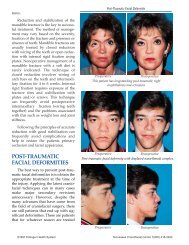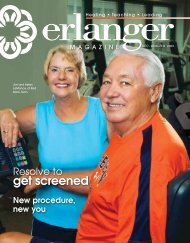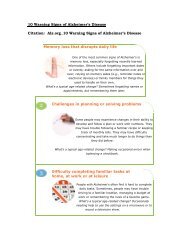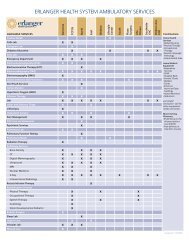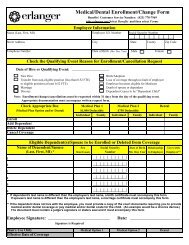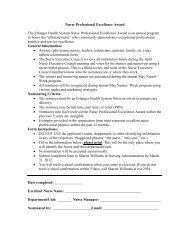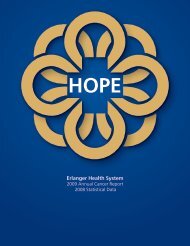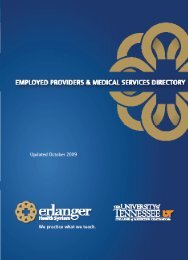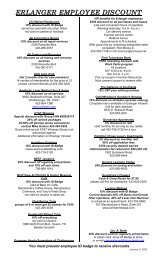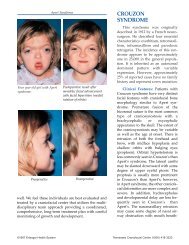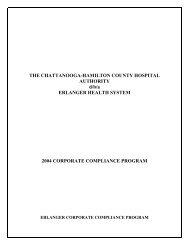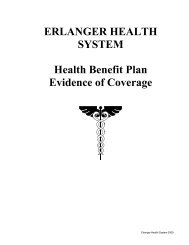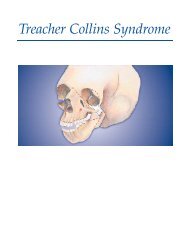2011 Cancer Committee Members - Erlanger Health System
2011 Cancer Committee Members - Erlanger Health System
2011 Cancer Committee Members - Erlanger Health System
You also want an ePaper? Increase the reach of your titles
YUMPU automatically turns print PDFs into web optimized ePapers that Google loves.
<strong>Cancer</strong> Registry Report<br />
A <strong>Cancer</strong> Registry is an information system designed for the collection, management, and analysis of data<br />
on persons with the diagnosis of cancer. The <strong>Erlanger</strong> <strong>Health</strong> <strong>System</strong> <strong>Cancer</strong> Registry utilizes the Electronic<br />
Registry <strong>System</strong> (ERS), a computerized database system, to input and maintain a wide range of<br />
demographic and medical information. These include: patient age, gender, race/ethnicity, residence, physical<br />
findings, screening information and occupation. The system also incorporates types/dates/results of<br />
procedures used to diagnose the cancer; primary site, cell type, extent of disease; cancer therapy including<br />
surgery, radiation therapy, chemotherapy, hormone or immunotherapy and follow-up which includes annual<br />
information about treatment, recurrence and patient status.<br />
The cancer registry is staffed by one certified tumor registrar (CTR) who has passed a national accreditation<br />
exam and one non-certified tumor registrar. Certified staff members are active in the National <strong>Cancer</strong><br />
Registrar’s Association and the Tennessee Tumor Registrar’s Association and annually attend state, regional<br />
and/or national meetings to stay abreast of the latest changes/updates in the cancer registry field.<br />
Registrars manage the data and report cancer statistics to the Tennessee State <strong>Cancer</strong> Registry. This data is<br />
combined with data from other reporting institutions in Tennessee for the purpose of tracking and analyzing<br />
state data. As an accredited cancer program by the Commission on <strong>Cancer</strong> (CoC), the registry also participates<br />
in the annual call for data and submits cases to the National <strong>Cancer</strong> Data Base (NCDB).<br />
Registrars work closely with physicians, administrators, researchers, and health care planners to provide support<br />
for cancer program development, cancer committee and cancer conference coordination, compliance<br />
of reporting standards, and serve as a valuable resource for cancer information with the ultimate goal of<br />
preventing and controlling cancer. The cancer registrar also is involved in managing and analyzing clinical<br />
cancer information for the purpose of education, research, and outcome measurement.<br />
From 2001-2010, a total of 8862 patient cases were entered into the registry with a successful follow-up rate<br />
of 99% which exceeds the 90% requirement by the Commission on <strong>Cancer</strong> standard. Lifetime follow-up is<br />
an important aspect of the cancer registry. Current follow-up serves as a reminder to physicians and patients<br />
to schedule regular clinical examinations and provides accurate survival information.<br />
14<br />
<strong>Cancer</strong> Registry Report



